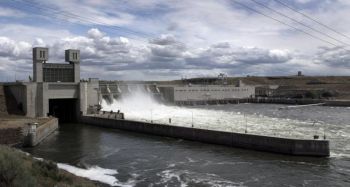forum
library
tutorial
contact

Groups Sue Over Endangered Salmon
by Annie WuThe Epoch Times, June 12, 2010
|
the film forum library tutorial contact |

|
Groups Sue Over Endangered Salmonby Annie WuThe Epoch Times, June 12, 2010 |
 Conservation group Idaho Rivers United, along with three fishing interest groups, filed suit last Thursday against the Washington State Department of Ecology. The suit charged the state agency with failure to protect the endangered salmon that must pass through a series of hydroelectric dams in the Columbia and Snake River system to migrate to the Pacific Ocean.
Conservation group Idaho Rivers United, along with three fishing interest groups, filed suit last Thursday against the Washington State Department of Ecology. The suit charged the state agency with failure to protect the endangered salmon that must pass through a series of hydroelectric dams in the Columbia and Snake River system to migrate to the Pacific Ocean.
The groups are represented by Earthjustice, "a non-profit public interest law firm," according to a June 3 press release. They had petitioned for an increase in the amount of water released over the dams, known as spill. Earthjustice attorney Amanda Goodin explained, "After they are born, the juvenile salmon need to migrate down the river to the [Pacific] Ocean." If the restrictions on water levels are removed, the groups say the fish, which include salmon and steelhead trout, can successfully move past the dams and avoid turbines that can kill them. The trout have the same life pattern as salmon--they migrate. After the Department of Ecology (also known simply as Ecology) denied the groups' request, they decided to file a lawsuit.
Idaho Rivers United seeks to, "protect and restore the rivers of Idaho," including Snake River, a tributary of Columbia River that runs through a large area of the state, according to the group's website. The Pacific Coast Federation of Fishermen's Association (PCFFA), the Northwest Sportfishing Industry Association (NSIA), and the Association of Northwest Steelheaders (ANS) are also suing Ecology. Their respective websites stated that PCFFA is a "politically active trade association of commercial fishermen," while NSIA is a lobbyist group. The ANS is "dedicated to enhancing and protecting fisheries and their habitats for today and tomorrow."
Two decades of monitoring found that increased spill levels increase salmon survival. According to National Geographic and Idaho Rivers United, the Columbia and Snake Rivers were once populated with millions of wild salmon. After the construction of dams, fish numbers dwindled. "All of Idaho's salmon species are listed as threatened or endangered under the Endangered Species Act," said Idaho Rivers United.
Since courts ordered an increase in water spill over dams in 2006, returns of salmon and steelhead have risen dramatically but are still not enough to counter the decline of many stocks, according to the press release. The groups suing Ecology say that if the amount of spill is increased further, more salmon and steelhead can survive migration. Because these fish are also caught and sold for public consumption, the dam regulations can affect the livelihood of fisheries and fishermen.
Currently there are regulations on two measurements of water levels, known as Total Dissolved Gas (TDG), which are taken at the tailrace (an area immediately below a dam's spillway) and the forebay (an area above the next downstream dam). Goodin said, "We want to keep the tailrace standard; that's important. But the forebay standard is the one we want either eliminated or increased, preferably just eliminated." The forebay TDG standard is currently at 115 percent.
In response, Ecology stated, "The Department of Ecology (Ecology) follows the rules of the federal Clean Water Act in its determinations that result in how much spill is allowed over dams in the Columbia and Snake rivers to help juvenile fish migrating to the ocean. We think it is helpful to emphasize that Ecology already allows more spill over dams--on a dam-by-dam scenario--through adjustments to state water quality standard rules. Ecology does not believe the overall benefits of additional spill versus detrimental effects to aquatic life is clear or sufficient to justify a rule revision of the water quality standards."
In September of 2007, an Adaptive Management Team (AMT) consisting of tribes, federal agencies, and conservation groups was assembled to "evaluate appropriate points of compliance" regarding TDG levels, according to an AMT report. After receiving Idaho Rivers United and other groups' petition, AMT agreed to a decision to not change the 115 percent forebay requirement. The team found that eliminating the forebay standard would increase the likelihood of "gas bubble trauma." Gas bubbles can form in the cardiovascular system of fish when water plunges from great heights. This blocks the flow of blood and the exchange of respiratory gases, which can cause great harm to the fish and even death in some cases.
learn more on topics covered in the film
see the video
read the script
learn the songs
discussion forum
